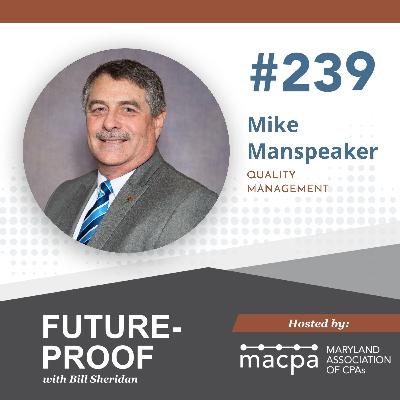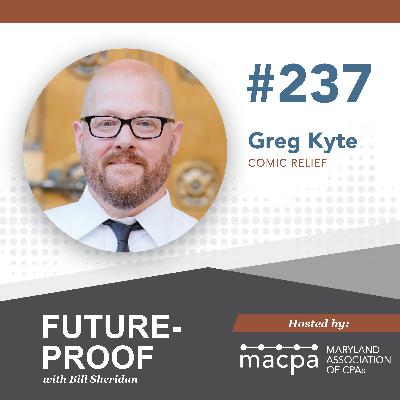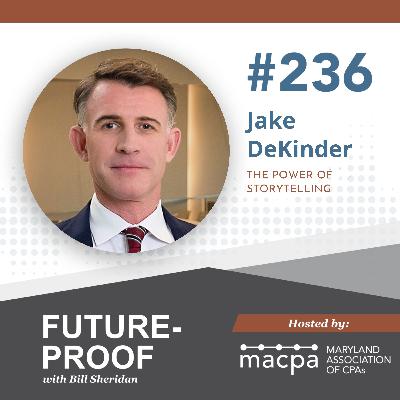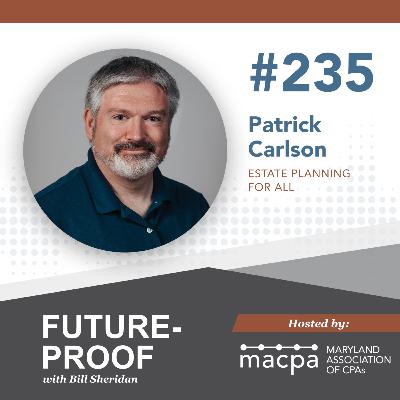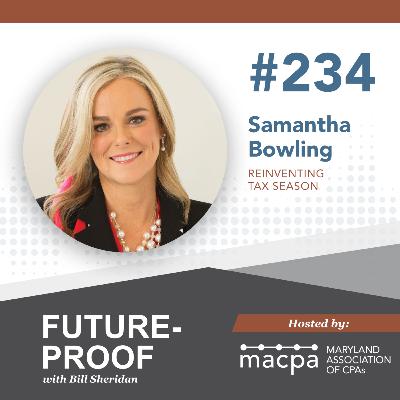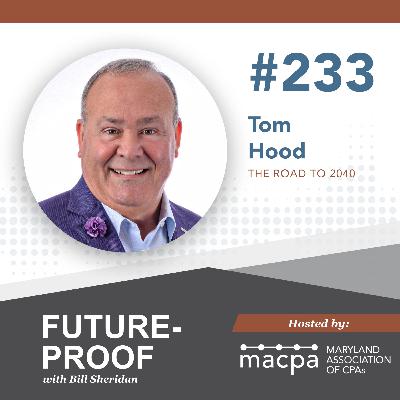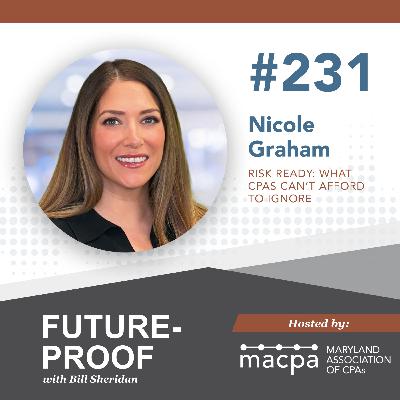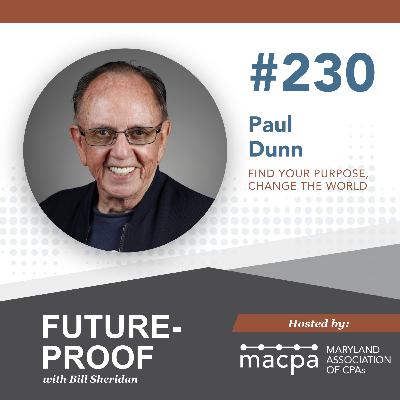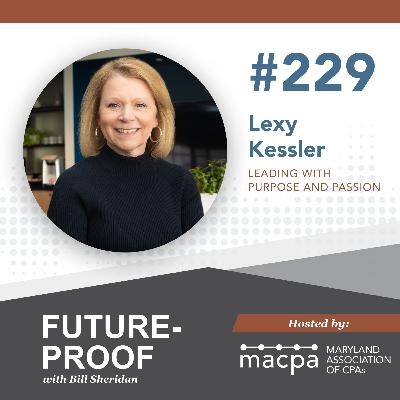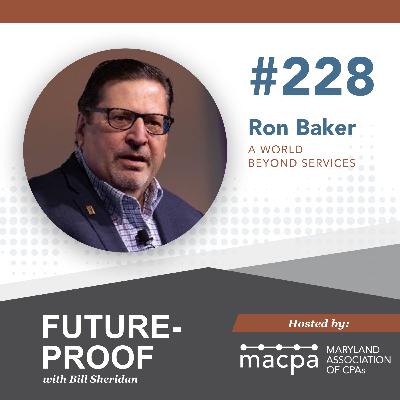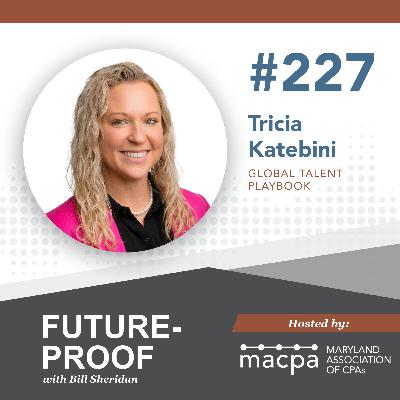Discover Future-Proof
Future-Proof

Future-Proof
Author: Bill Sheridan of MACPA
Subscribed: 66Played: 1,485Subscribe
Share
© Copyright 2026 Bill Sheridan of MACPA
Description
How should you future-proof your organization and your career in a complex and chaotic world? Host Bill Sheridan, thought leader with the Maryland Association of CPAs, gets answers from some of today's most forward-thinking thought leaders.
242 Episodes
Reverse
What does the future of audit oversight look like in a rapidly changing world? In this episode, we sit down with Christina Ho, who recently announced her departure from the Public Company Accounting Oversight Board (PCAOB), for an inside look at what’s next for audit regulation.Christina shares her perspective on using AI and advanced analytics in audit oversight, the importance of common-sense regulation, and how regulators can balance investor protection with innovation and market resilience.This timely conversation offers valuable insight into the forces shaping audit quality and trust in today’s capital markets.Resources:Christina Ho LinkedIn ProfileMACPA Accounting & Auditing Resources
What can CPAs and business leaders learn from one of the most entertaining organizations in the world? In this episode, we sit down with Tim Naddy, CFO of the Savannah Bananas, to explore how purpose, culture, and leadership drive performance in high-pressure environments.Behind the dancing players and sold-out stadiums is a clear philosophy. The Bananas do not just play baseball. They create joy. Tim shares how a strong sense of purpose helps teams manage intense schedules, constant travel, and burnout, and why culture must be treated as infrastructure, not a perk. He explains how empathy, flexibility, and engaged leadership keep people energized and performing at their best.You can hear more from Tim live as the keynote speaker at MACPA’s 2026 Converge event on April 30 at the BWI Hilton.Resources:Dr. Tim Naddy LinkedIn profileSavannah Bananas website2026 Converge event page & registration
A major shift is coming to the accounting profession. In December 2025, a new suite of quality management standards will take effect, replacing the long-standing quality control framework firms have used for decades. This change goes beyond new policies; it reflects a broader mindset focused on continual improvement, risk awareness, and firmwide accountability.To help us understand what is coming, we sit down with Mike Manspeaker, past chair of the MACPA board and a member of the AICPA Auditing Standards Board. With deep experience in peer review, audit evidence, risk response, and technology, Mike offers an insider’s perspective on why these standards matter and how firms can prepare.Mike explains that the new standards are not burdens but tools that help practitioners deliver high-quality work and manage growing risks. We discuss the transition challenges firms may face and the opportunities to build a stronger culture of communication, leadership, and shared responsibility for quality.Resources:AICPA Quality Management StandardsAICPA Quality Management Implementation Guide ResourcesCoastal Peer ReviewMACPA Quality Management ResourcesAICPA Peer Review Program
What happens when you are ready to step away from the business you have built? In this episode of Future-Proof, we sit down with Erin Daiber, founder of Well Balanced Accountants, to explore why effective succession planning starts long before retirement.Erin shares practical guidance on developing future leaders, creating a culture that supports growth, and avoiding common pitfalls like confusing technical skill with leadership potential. She also breaks down what to do if you realize you do not yet have a clear successor and touches on the rising influence of private equity in firm transitions.This conversation is a timely reminder that succession planning is not an end-of-career task. It is an ongoing strategy that helps you strengthen your firm today while preparing it for tomorrow.Resources:Aon, MACPA Preferred ProviderWell Balanced Accountants with Erin DaiberErin Daiber LinkedIn Profile
There is no single path to success in accounting, and few people prove that better than Greg Kyte. In this episode of Future-Proof, we explore how Greg built a one-of-a-kind career that blends finance, comedy, and purpose in ways that challenge traditional ideas of what it means to be a CPA.Greg is the Controller and CFO at Riverwoods Medical Arts Center in Utah, but that is only part of his story. He is also a stand-up comedian, keynote speaker, fraud expert, podcaster, cartoonist, and MC, using humor to bring humanity and connection into a profession often seen as buttoned up.Originally part of MACPA's CPA Purpose series, this conversation digs into how Greg found meaning by bringing his personal passions into his professional life. Greg shows that joy, creativity, and authenticity all have a place in our work.If you have ever felt boxed in by what an accounting career “should” look like, this episode is your reminder that you can bring your whole self to the profession and make it a lot more fun along the way.ResourcesGreg Kyte LinkedIn ProfileMACPA's CPA Purpose CampaignGoing Concern commentary and cartoons by Greg Kyte
In today’s data-driven world, information is everywhere, but what truly sets professionals apart is their ability to tell the story behind the numbers. In this episode of Future-Proof, we sit down with Jake DeKinder, Head of Client Communication at Dimensional Fund Advisors, to explore why storytelling may be the most essential skill CPAs can master.Jake explains how data alone doesn’t inspire action; stories do. He shares his framework for effective communication, the Four S’s of Storytelling (scripts, stories, sketches, and supplements), and shows how authentic, human connection builds trust and meaning in client relationships.Jake will also present at the MACPA’s 40th Annual Personal Financial Planning Conference on October 28, where he’ll dive deeper into how financial professionals can transform data into stories that stick.It’s not just about communicating numbers; it’s about helping people see the meaning in their money.Resources:40th Annual Personal Financial Planning ConferenceJack DeKinder LinkedIn ProfileDimensional Fund Advisors Website
Estate planning isn’t just for the wealthy, it’s for anyone who wants to protect the people and causes that matter most. In this episode of Future-Proof, we sit down with Patrick Carlson, Associate General Counsel for Estate and Tax Product at Vanilla, to explore how simple planning steps can bring peace of mind to everyday clients.Patrick, who’s presenting at the MACPA’s 40th Annual Personal Financial Planning Conference, shares practical ways to make estate planning accessible, meaningful, and essential for financial professionals. It’s not about doom and gloom — it’s about love, legacy, and making sure your wishes are honored.Resources:MACPA 40th Annual Personal Financial Planning Conference RegistrationPatrick Carlson LinkedIn Profile
Busy season horror stories of 80-hour weeks, sleepless nights, and lost weekends have long defined the accounting profession. But Samantha Bowling, managing partner at GWCPA, is rewriting that narrative.This past tax season, her firm went bold: no weekends, a 50-hour cap, mandatory extensions, upfront pricing, and a 15% fee increase. The payoff? Nearly full client retention, lighter partner workloads, and a team that felt energized instead of exhausted.In this episode, Samantha shares how GWCPA pulled it off, what challenges came with change, and why people-first innovations like these may be the key to attracting talent and future-proofing the profession.If you have ever thought, “There has to be a better way,” you will want to hear this conversation.ResourcesSamantha Bowling, CPA, CFE, CGMA LinkedIn ProfileGWCPA Firm WebsiteMACPA Preferred Providers
Tom Hood, Executive Vice President of Business Growth and Engagement at the AICPA, shares his perspective on the forces shaping the future of accounting and finance through Accounting and Finance 2040: Rise to the Future Together.In this conversation, Tom discusses the rapid evolution of the finance function, driven by generative AI, digital transformation, shifting business models, and changing workforce expectations. He examines the skills professionals will need to thrive, highlighting adaptability, curiosity, and strategic thinking alongside technical expertise.Tom also offers practical advice for finance leaders and professionals on how to prepare themselves and their teams for what is coming next.Resources:Tom Hood, CPA, CGMA, CITP, EVP Business Engagement & Growth, AICPA LinkedInMcKinsey Reports on CFO PrioritiesDeloitte CFO Signals ReportGartner Finance Insights
In today’s polarized climate, terms like DEI and diversity can spark debate, but the need for fairness at work remains just as important. In this episode, Siri Chilazi, co-author of Work Fair: Data-Driven Design for Real Results, joins the conversation to explore what actually drives equity in the workplace.Instead of buzzwords or big proclamations, Siri focuses on small, practical changes that make a real impact. She shares how reducing bias in hiring, running more inclusive meetings, and building systems where talent has a true chance to shine can lead to meaningful progress. She calls this moment a reset, a chance to step back and ask what’s really working.If you're looking for ways to create a fairer workplace grounded in evidence and action, this episode offers steps to get started.Resources:Siri Chilazim Author, Academic, Speaker and Consultant, website"Make Work Fair: Data-Driven Design for Real Results", by Siri Chilazi, Iris Bohnet
Risk is evolving quickly, and CPAs need to stay ahead. In this episode of Future Proof, we talk with Nicole Graham, risk consultant at Aon, about how firms can turn risk management into a strategic advantage.From cyber threats and regulatory changes to the everyday use of generative AI, Nicole shares real-world trends and practical tips to help firms stay protected. Learn how to spot red flags early, strengthen engagement practices, and embed a proactive risk culture across your team.Smart risk management isn’t optional, it’s essential to building a future-ready firm.Resources:Ashley Graham, Risk Consultant, LinkedInAon Insurance Services, an MACPA Preferred Provider
This week on Future Proof, Paul Dunn, award-winning entrepreneur, global business leader, and founder of B1G1 (Business for Good), joins the conversation to explore the true purpose of the accounting profession.Paul challenges CPAs to shift from focusing on what they do to why they do it. He shares how small, purpose-driven actions can create lasting impact and how accountants can become storytellers who communicate the real value of their work. His message is clear: CPAs are heroes (they just don’t always realize it).This uplifting episode is a powerful reminder of how purpose and impact can redefine the profession and inspire change far beyond the bottom line.Resources:B1G1 (Business for Good)Paul Dunn’s TEDx TalksThe Soul of the Enterprise PodcastVerasage InstituteMACPA Purpose Resources
This week on Future Proof, we’re joined by Lexy Kessler, partner at Aprio, former chair of the Maryland Association of CPAs, and now the third Marylander to chair the AICPA’s board of directors. Lexy brings insight, inspiration, and a powerful sense of purpose to this conversation.She shares how a high school bookkeeping class sparked her career, why she was an early adopter of technology, and how a short break from public accounting reaffirmed her calling. Now in a national leadership role, Lexy is focused on deep listening, building trust across the profession, and addressing the talent pipeline with both policy and heart.This episode is a must-listen for anyone seeking renewed purpose and direction in the profession.ResourcesLexy Kessler LinkedIn ProfileLexy Kessler AICPA ProfileNational Pipeline Advisory Group
In this episode, Ron Baker, founder of the VeraSage Institute, challenges traditional views of innovation in accounting. Instead of focusing on technology like AI and automation, Ron advocates for transforming the value we provide to clients, shifting from transactional services to outcomes and personal growth. He highlights Fender's shift from selling guitars to teaching customers how to become musicians as a key example of transformation.Ron also reframes burnout as "moral injury," the emotional toll of not living up to the deeper purpose of the profession, which is helping people. This conversation is full of actionable ideas to help CPAs evolve beyond billable hours and checklists. Tune in for a fresh perspective on the future of accounting and how to make a greater impact.Resources:VeraSage InstituteRon Baker biography and workRon Baker's podcast, The Soul of the Enterprise "The Experience Economy" book by Joe Pine and James GilmorePwC 2023 Consumer Insights Report Deloitte’s Human Outcomes Study
Firms are facing major capacity and talent challenges—and many are turning to offshoring, or global resourcing, to keep up. But how do you make it work?In this episode of Futureproof, GRF CPAs and Advisors partner Tricia Katebini shares how her firm built a global team that’s fully integrated into their culture and client service model.Whether you’re just getting started or refining your approach, this episode is packed with practical insights to help you navigate the future of talent.Resources:Tricia Katebini, CPA, MBA, Partner, Audit and Assurance at GRF CPAs and AdvisorsIndia GCC Landscape Report – The 5 Year Journey
AI adoption is surging, but most companies struggle to scale its value. Tech expert and be radical co-founder Pascal Finette helps leaders navigate the evolving technology landscape—and today, he’s breaking down what businesses get wrong about AI and how to get it right.With nearly 30 years in tech, including leadership roles at Google, eBay, and Mozilla, Pascal shares practical strategies for integrating AI, overcoming challenges, and driving real impact.Listen in to learn how to harness AI for growth, efficiency, and innovation.Resources:Pascal Finette websitebe radical Boston Consulting Group (BCG) report, "Where’s the Value in AI?"McKinsey & Company report, "AI in the workplace: A report for 2025"
In this episode, I speak with Mark Koziel as he steps into his new role as CEO of the AICPA, succeeding Barry Melancon, who led the organization for nearly 30 years. Mark shares his vision for the profession, bringing a global perspective from his experience at both the AICPA and Allinial Global.We discuss key challenges like talent shortages, technology, and regulatory shifts, as well as the importance of community and keeping the profession strong for future generations. From private equity risks to new opportunities, Mark sees every challenge as a chance for growth.Whether you're a CPA, student, or leadership enthusiast, this conversation is packed with valuable insights. Resources:Mark Koziel LinkedIn ProfileJournal of Accountancy article, "Mark Koziel to become CEO of the Association of International Certified Professional Accountants", by Kim Nilsen
Client Advisory Services (CAS) has become one of the most profitable and in-demand service lines in accounting, with revenues surging 17% in two years. Amy Bridges, Senior Manager of Practice Development at CPA.com, unpacks key findings from the latest CAS Benchmark Survey, revealing how top firms achieve $250,000 in median net client fees per professional and why 90% have moved away from hourly billing. From pricing strategies to scaling advisory services, this conversation offers actionable insights for firms looking to maximize CAS growth.Resources:CPA.com’s 2024 CAS Benchmark SurveyAmy Bridges, LinkedIn Profile
Maryland's General Assembly is in session, facing a significant budget deficit. In this episode, State Senator Brian Feldman, CPA, breaks down the tough decisions ahead, including the potential taxation of professional services. He emphasizes why legislative advocacy is crucial for CPAs, who can influence tax policy and business decisions. Senator Feldman also explains how Maryland’s legislative process is accessible, offering CPAs a chance to make a real impact. We also discuss how Maryland’s economic, energy, and environmental policies will shape the future, making it vital for CPAs to be involved.Resources:Brian J. Feldman, Maryland State SenatorMACPA's annual CPA Day in AnnapolisMACPA editorial, "Fiscal concerns dominate Maryland's 2025 legislative session", by Bill Sheridan
What’s next for CPAs after the election? I sit down with Lauren Pfingstag Vahey, AICPA’s Director of Congressional and Political Affairs, to explore the impact of a new president and Congress on the profession. We discuss the future of the Tax Cuts and Jobs Act, potential new tax legislation, and the recent IRS funding boost from the Inflation Reduction Act. Lauren also shares insights on the possible restructuring of the PCAOB under SEC oversight and offers advice on how CPAs can stay actively engaged in legislative advocacy. Tune in to this essential conversation to navigate the evolving political and regulatory landscape.Resources Lauren Pfingstag Vahey LinkedIn Profile AICPA Congressional and Political Affairs Team




